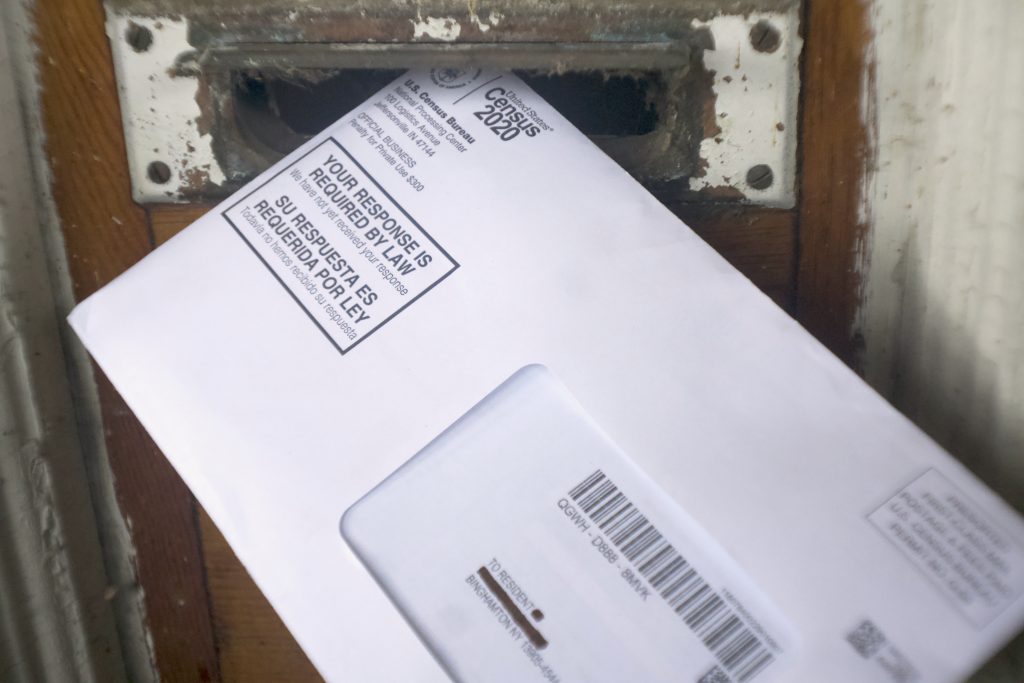The United States Constitution requires a census to be conducted every 10 years to count the country’s population and the 2020 census is currently underway nationwide, including Binghamton.
The data that comes from the census will be used for the next 10 years by both federal and state governments as well as other organizations to make decisions regarding the allocation of political representation, funding and other resources.
Census questions ask about basic information regarding age, sex, ethnicity and race of all of the people who live in a given area. By federal law, all information that is gathered is confidential and census workers are not allowed to ask if someone is a citizen. It is required that every person currently residing in the United States responds to the census. This year is the first year respondents have the option to fill out the census online.
After the census is complete, the government will use the data to reapportion the number of seats each state has in the United States House of Representatives. Voting districts will be redrawn to reflect the current population in the country. Reapportionment will also affect how many electoral votes each state has for future presidential elections.
The census is used to determine where hundreds of billions of dollars of federal and state funding will go. Government assistance programs such as the Supplemental Nutrition Assistance Program (SNAP), Medicaid and Medicare all use the census to determine how much money is given to states to fund these programs. Education programs, such as Head Start, a program to promote school readiness of children below five years of age, and Pell Grants, which are federally funded grants for students to attend higher education, all rely on census data.
Angela Riley, councilwoman for the city of Binghamton’s third district, has been urging all citizens of Binghamton, including students, to fill out the census.
“Students are a vital portion of the city of Binghamton, particularly the third district, so it is important that they are counted as well,” Riley wrote in an email.
Conducting a nationwide count of the population is a difficult task and there has always been the problem of certain groups being underrepresented. According to the Center for Civic Engagement (CCE), people living in rural areas, African Americans, Latinos and other minorities are often undercounted. College students are also underreported due to their frequent changes in location.
The COVID-19 pandemic has only made the count more difficult as door-to-door efforts were suspended at one point and many people have been relocating due to the virus. This has only presented more challenges and threatens the possibility that millions will be not counted or will be improperly counted.
At Binghamton University, the CCE had been promoting filling out the census since the spring 2020 semester, and it will still be promoting filling it out until Sept. 30, which is when the census closes. They inform students and assist with the census questionnaire if needed. Alison Twang, the associate director at the CCE, discussed the difficulties the pandemic has had on getting an accurate count of students.
“The timing of initial census mailings in mid-March coincided with many college students being displaced from their usual residence,” Twang said. “As a result, many students left the area without responding, and traditional outreach efforts were more difficult to deliver.”
The census is supposed to be filled out based on where a person lives most of the year, so the U.S. Census Bureau advises that college students should be counted based on where they live during the school year, rather than their home address.
The U.S. Census Bureau has also issued a statement for students who chose to be online for the fall semester. Students should fill out the census based on where they were on April 1, which is Census Day. If they lived in the Binghamton area for the beginning of the spring semester, then they should use that address.
According to the CCE, students who live on campus should not individually respond to the census. BU has coordinated a count with the Census Bureau to ensure all students who live on campus are represented as they are considered part of the “group quarters.”
Students who live off campus in the Binghamton area are advised to fill out the census using their address. Students who live with roommates are advised to coordinate and to submit only one form for their household with everyone that lives there. International students who reside in the United States are also supposed to respond to the census.
To respond to the 2020 census, visit 2020census.gov by Sept. 30. Additionally, BU’s CCE provides information and assistance for students completing the census.



